50-year class honored:
- William H. Alverson, Milwaukee
- Charles F. Aschenbrenner
- Robert Lynn Bartholic, Littleton, CO
- Bernard R. Bitter, Brookfield
- William A. Bolgrien, Beloit
- Loyd W. Bonneville, Madison
- John E. Borgerding
- John J. Bouma, Phoenix, AZ
- Darryl L. Boyer, Milwaukee
- David J. Cannon, Milwaukee
- Joseph J. Carpenter, Ellison Bay
- Arlen C. Christenson, Madison
- Thomas L. Consigny
- Kenneth H. Conway, Jr., Baraboo
- George W. Crownhart
- Adam James Dadaou
- Jack Richard Davis
- Frank C. DeGuire, Milwaukee
- Hon. Thomas P. Doherty, Elm Grove
- Paige J. Donnelly, Saint Paul, MN
- Griffin G. Dorschel, Madison
- Edmund H. Drager, Jr.
- Hon. William D. Dyke, Dodgeville
- Thomas W. Ehrmann, Brookfield
- Gerald L. Engeldinger
- Paul J. Ferr, Milwaukee
- Robert M. Finley
- Darrell W. Foell, Dousman
- Aubrey R. Fowler, Madison
- Hon. William D. Gardner III, Milwaukee
- Franklyn M. Gimbel, Milwaukee
- George F. Graf, Brookfield
- Hon. Rupert J. Groh, Jr., Tucson, AZ
- Donald J. Harman, La Crosse
- Thomas P. Hayes, Brookfield
- Reginald M. Hislop, Jr., West Allis
- Edward W. Howe
- David J. Hughes, Wauwatosa
- Florian H. Jabas, Bradenton, FL
- William L. Jones
- George P. Kersten, Mequon
- Curtis Kirkhuff, Madison
- Evan M. Kjellenberg, Sister Bay
- Robert W. Kohn, Santa Barbara, CA
- F. Robert Kolacke, Edina, MN
- Gerald K. Konz, Racine
- William A. Korbel
- John V. Kozina
- Gene G. Krug, Medford
- Ralph H. Lane, Racine
- James G. Lawrence, Madison
- Graham W. Le Barron
- Robert G. Lee, Madison
- Donald A. Levy, Cedarburg
- Leonard J. Lewensohn, Milwaukee
- Robert L. Lindgren
- Eugene C. Lippert, Ocala, FL
- John C. Lucht, Raleigh, NC
- Humphrey J. Lynch, McFarland
- Paul R. Lynts
- Joseph A. Malek
- Victor Manian, Glendale
- Stephen H. Marcus, Milwaukee
- John P. McCrory, Santa Monica, CA
- John R. McDonald, La Crosse
- Roger W. McKenna, Kewaskum
- Kenneth Meshbesher, Minneapolis, MN
- Gerry M. Miller, Milwaukee
- Daniel J. Miron, Marinette
- William J. Mulligan, Milwaukee
- Joseph J. Muratore, Sr., Racine
- Hon. Gordon G. Myse, Appleton
- Burton F. Natarus, Chicago, IL
- William F. Nelson, Madison
- Dieter H. Nickel, Merrill
- Virginia D. Nordin
- Harry J. O'Leary, Janesville
- Lawrence M. Phillips, Elm Grove
- Dudley W. Pierce, Watersmeet, MI
- Patrick Putzi, Fort Lauderdale, FL
- James E. Quackenbush, Madison
- Hon. John R. Race, Elkhorn
- Larry W. Rader
- David H. Raihle, Sr., Chippewa Falls
- Robert D. Ready
- John Tim Reilly
- Andre M. Saltoun, Santa Barbara, CA
- Norman Saracoff, Neillsville
- Thomas G. Sazama, Merrill
- Hon. Leo F. Schlaefer, West Bend
- Sheldon Sepstead, Grafton
- Edward A. Sirkin, Miami, FL
- Robert A. Slattery, Dousman
- George E. Smith, Oconomowoc
- Hon. Patrick L. Snyder, Oconomowoc
- Richard E. Sommer, Rhinelander
- Harrison M. Spence
- William R. Stanczak, Waukegan, IL
- Henry J. Steenstra, Jr., Elizabeth City, NC
- Clifford E. Stoner, Hayward
- Robert E. Sutton, Milwaukee
- James E. Talaska, Houston, TX
- Stuart K. Taussig, Chicago, IL
- Gerald J. Thain, Madison
- Louis R. Ullenberg, Princeton
- Kenneth E. Voss, Milwaukee
- Gerald S. Walsh, Wauwatosa
- Robert S. Washburn
- Albert E. Wehde, Sunnyvale, CA
- Joseph W. Weigel, Elm Grove
- Richard C. Weil, Howey in the Hills, FL
- Daniel J. Weiss, Mequon
- Robert Weninger, Lubbock, TX
- Jack W. White
- Clay R. Williams, Milwaukee
- Gary R. Yakes, Oshkosh
- Douglas A. Yanggen
- Richard Yetter, El Paso, TX
- William A. Yost III, Ranchos de Taos, NM
|
By Joe Forward, Legal Writer, State Bar of Wisconsin
June 2, 2010 – In 1960, John F. Kennedy defeated Richard Nixon to become the 35th U.S. president, Earl Warren was chief justice of the U.S. Supreme Court, Harper Lee published To Kill a Mockingbird, and civil rights and the Vietnam War were unfolding.
The year 1960 also produced a number of lawyers who have made significant impacts in the last 50 years. Today, the State Bar of Wisconsin will honor members who have surpassed the 50-year milestone in the legal profession.
This distinguished list includes former and current corporate executives, public and private sector lawyers, judges, law school professors and deans, and state and local bar leaders – all with a distinct and fascinating 50-year path.
Today they serve as the experts, leaders, decision-makers, and mentors. They forged and continue to forge paths that traverse many aspects of Wisconsin life.
For Frank C. DeGuire – a former private practitioner, corporate president, and law school dean − that path started in the middle of the ocean somewhere. He served as a legal affairs officer aboard a U.S. Navy destroyer, handling cases that dealt with military justice code violations.
“That really got me directed to the law,” said DeGuire, who later attended Marquette Law School, graduating in 1960. “I really enjoyed doing research and following up on the cases.”
Milwaukee-based litigator Franklyn M. Gimbel, former State Bar president, caught a glimpse of his legal future as a high school senior the night he played the role of prosecuting attorney in the murder-mystery play entitled “Night of January 16th.” Interestingly enough, he faced off against Robert L. Habush, now president of Habush, Habush and Rottier, S.C., who played the defense attorney. That was 1954.
“I always had a respect for lawyers, and I thought I could do a good thing for people by becoming one,” Gimbel said. “I also had a pretty good talent for talking.”
Whatever their motivations for attending law school, the class of 1960 has made lasting and positive impacts on the legal, business, governmental and educational communities in Wisconsin and beyond, including military service. The following members are just a handful of the many who have contributed to the legal profession over the past 50 years.
The man with a 10-year plan
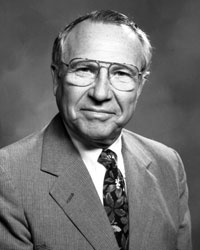
Frank C. DeGuire didn’t like to stay in one place for more than a decade, it seems.
After law school, he spent 10 years as a private practitioner, 10 years as president of Pabst Brewing Co., and 10 years as dean of Marquette Law School.
“My career in law has been absolutely fascinating, in part because of the different experiences I’ve been able to have,” DeGuire said. “I always seemed to find something new after 10 years.”
After law school, DeGuire joined Michael, Best & Friedrich before joining Pabst, where he was selected to succeed the general counsel. After almost three years, however, Pabst President James Windham had other plans – he wanted DeGuire to take over as president. In 1973, he did. When threats of corporate takeover emerged, he decided to move on.
In 1984, DeGuire became law school dean at Marquette University and remained so until 1994. During that time, DeGuire served as a reporter for the State Bar committee responsible for redrafting the Wisconsin Business Corporation Code (Wis. Stat. ch. 180).
Clay Williams, who also celebrates 50 years in the legal profession as a 1960 graduate of the University of Michigan Law School and senior counsel at von Briesen & Roper, S.C., Milwaukee, chaired the State Bar committee that helped draft the new code.
Both DeGuire and Williams collaborated with Kenneth B. Davis, now dean at U.W. Law School, and Christopher Berry, partner at Foley and Lardner LLP in Madison, to author Wisconsin Business Corporation Law (1992) – published by the State Bar − the primary reference on the subject at the time.
“The intent was to keep Wisconsin businesses in Wisconsin,” DeGuire said of the massive undertaking. “For the most part, I think the revision has served that purpose.”
Now, DeGuire serves as Marquette University Law School emeritus dean and professor of law, plays golf, and tries to keep track of 28 grandchildren.
The lawyer-politician-judge
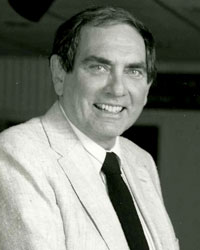
Like DeGuire, others have had an extreme influence over the life and times of Wisconsin. The Hon. William Dyke – a University of Wisconsin Law School graduate − certainly did. He still does.
Judge Dyke is currently serving his 13th year as trial judge in Iowa County Circuit Court and second term as chief judge. He got his start in television and radio while in law school, and even interviewed 1960 presidential candidates Kennedy and Nixon and other high-powered politicians as host of WISC-TV’s “Meet the State.”
He went on to become a two-term mayor of Madison from 1969-73, then practiced law for many years as a self-proclaimed “country lawyer” in Mineral Point. In 1996 − 36 years into his career − Wisconsin Gov. Tommy Thompson appointed him as circuit court judge.
“It’s like when people ask what you want to be when you grow up – I say I always wanted to be an artist, but I think I’ll be a judge for a while first,” Dyke joked.
Judge Dyke carved a path that led from small-town lawyer to capitol city mayor to circuit court judge – with other major accomplishments along the way. In 1997, Judge Dyke instituted the state’s second “teen court,” which lets teenagers administer justice when their peers commit minor offenses. Today, there are 38 teen courts throughout the state.
Last year, Judge Dyke piloted Wisconsin’s first circuit court-level foreclosure mediation program, aimed to foster mediation between lenders and borrowers for possible resolution without foreclosure.
“There have been a number of cases where homeowners figured out a way to stay in the home without losing it to foreclosure,” said attorney Mark Frankel of Middleton-based Frankel ADR. “Absent the existence of the mediation program, I do not think that sort of resolution would have occurred. I give a lot of credit to Judge Dyke for his creative use of judicial resources to institute the program.”
Judge Dyke also brought the Farmer’s Market to Madison, co-founded Park Bank and initiated new programs like the Art-in-the-Courthouse project, which allows local artists and students to exhibit artwork in the courthouse.
“It occurred to me that we had all this wall space, why not let local artists use it to display their work,” said Dyke, a life-long artist himself. The program even drew an exhibit from internationally known artist Warrington Colescott of Hollandale.
The litigator
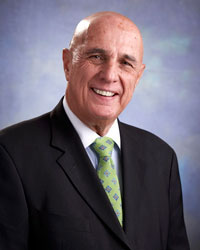
Over the years, Franklyn M. Gimbel’s career and life experiences have been chronicled extensively – his contributions recognized in many circles. Yet, after a distinguished career, countless awards, and a successful law practice, community involvement still tops the list as one the most rewarding aspects of the job.
“Giving back to the community – that’s a great reward,” said Gimbel – once dubbed “Mr. Clout” − who is still a thriving litigator at age 74. “I would encourage law school graduates today to find what interests them, and get involved in the community.”
Gimbel made his mark early. Within three years of graduating law school at Marquette University in 1960, he ran for state representative at the age of 26 and emceed a Democratic Party dinner that featured then U.S. Vice President Lyndon Johnson.
Founding partner of Gimbel, Riley, Guerin, Brown LLP – Gimbel began his litigation career as an assistant U.S. attorney from 1963-68. As a young federal prosecutor, he is known for having successfully prosecuted mafia boss Frank Balistrieri for tax evasion.
He then moved to private practice in 1968 doing criminal defense work. His practice has now expanded to include complex civil litigation and employment law.
“I think I was earning $9,000 per year as a prosecutor, less than 65 percent of other attorneys,” Gimbel said. “The market was tough when I first graduated. Working as an assistant U.S. attorney really laid the foundation for my future practice.”
In addition to law practice, Gimbel does pro bono work and remains active in the Milwaukee business community. Since 1994, he has served as chairman of the board of directors for the Wisconsin Center District, owner and operator of the Midwest Airlines Center, U.S. Cellular Arena, and the Milwaukee Theatre. He also holds a leadership role in other organizations.
“Every day is a new adventure,” said Gimbel, who served as Milwaukee Bar Association president from 1976-77 and State Bar president from 1986-87. “I never know what issue will come up next, and that really keeps me interested in what I’m doing.”
The professor
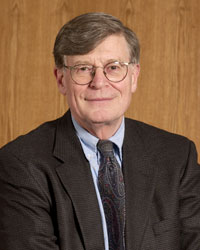
Gerald Thain, emeritus professor of law at U.W. Law School, saw the vision of professorship at an early age, but wasn’t sure if he would get there. Ultimately, he did.
“I always knew I wanted to be a professor of something,” Thain said. “The more I learned about the kinds of things that lawyers did, the more I became interested in law.”
Thain graduated from the University of Iowa College of Law in 1960, then served in the U.S. Air Force Judge Advocate General’s Corps (JAG) in Tennessee and South Vietnam before joining the Federal Trade Commission.
In 1963, he helped write a brief in FTC v. Colgate-Palmolive, 380 U.S. 374 (1965), a case in which the business advertisement claimed its shaving cream was effective enough to shave sandpaper. In 1970, he became director of the FTC’s National Advertising Regulation Division. Thoughts of becoming a law professor were starting to fade, until academia came knocking.
A U.W. law professor − William Whitford − interviewed Thain for a journal article he was writing and encouraged him to use his expertise as a professor. Soon after, in 1974, Thain ended up at U.W. Law School. He retired in 2006, after 32 years.
“Funny how that worked,” Thain said.
In addition to preparing some of Wisconsin’s future lawyers in areas like secured transactions and unfair trade practices, he traveled the world to lecture on trade regulation and commercial law. He views specialization as one of the biggest changes to law practice in the last 50 years.
“As law becomes more globalized, lawyers have more opportunities to make significant impacts in many different areas,” Thain said. “Good lawyers learn to find the jugular of any issue.”
The Californian
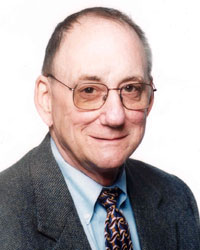
Although he left Wisconsin long ago for sunny California, Ted Wehde has always been a fixture of the Wisconsin legal community. A 1960 graduate of Marquette Law School, Wehde joined the U.S. Army JAG Corps and served three years as officer.
While stationed in Northern California, he decided he liked it there. He didn’t know it then, but that decision would define the remainder of his career.
“I figured it was join the army or get drafted,” Wehde said, who worked at a bank in Chicago before law school. “I always figured I would go back to banking or be a trial lawyer.”
Instead, Wehde became interested in government contract law. For nearly 20 years (1974-95), he traveled the world negotiating government contracts as International Counsel for FMC Corp. He has also held positions with the U.S. Atomic Energy Commission and Lockheed Aircraft Corp.
“I have had a lot of fun during my career, meeting very interesting people all over the world,” Wehde said. “I’ve been fortunate. That area of law sort of picked me.”
But he has always returned to Wisconsin, the place that admitted him to practice law in 1960. Just recently, he attended the 50-year reunion at Marquette Law School and returns to serve on the State Bar’s Board of Governor’s as a Nonresident Lawyers Division representative.
“The reunion really highlighted some of the major changes in the legal profession in the last 50 years,” Wehde said. “When I graduated, I think we had one woman in our class. Dean Kearney noted that many law schools are now over 50 percent female.”
Whatever the path, the 50-year class has bestowed the gifts of service, education, experience, and community participation. Celebration of this major accomplishment will take place today (June 2) in Delafield. A reception begins at 11 a.m., followed by lunch at 11:30 a.m.
